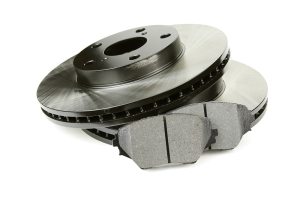
There are two ways to check for brake wear on disc brakes…by looking and by listening. First, check for wear by looking at your brake pads through the spaces between the wheel’s spokes. The outside pad will be pressed against a metal rotor. Generally, there should be at least 1/4 inch of pad. If you see less than 1/4 inch of pad, you may want to have your brake pads inspected or replaced.
Have you ever heard a high-pitched screeching sound when you applied your brakes? That’s a small metal shim, called an indicator, which is giving you an audible warning that you need to replace your brake pads. You should be aware of this sound. One exception is if your car has been sitting after being exposed to water, such as from rain or from washing it. The moisture can cause a thin layer of rust to develop on the brake rotors. When you first apply the brakes, the pads pressing on the rust-covered rotors may cause a squeal for a few stops until the rust is worn off and then the sound will disappear.
If your brakes are not as responsive as they should be or if the pedal goes toward the floor, this could be an indication of a leak in the braking system. It could be an air leak (in the brake hose) or a brake fluid leak. One sign of a brake fluid leak is the presence of a small puddle of fluid when the car is parked.
If your vehicle “pulls” to one side while braking, it may be a sign that the brake linings are wearing unevenly or that there is foreign matter in the brake fluid. Your vehicle may need a brake adjustment or to have the fluid drained and replaced.
This loud metallic sound means that you have worn down the pads completely, most likely beyond replacement. The grinding or growling noise is caused by the two pieces of metal rubbing together. This can scratch your rotors, creating an uneven surface.
A vibration or pulsating brake pedal is often a symptom of warped rotors, but can also indicate that your vehicle is out of alignment. The vibration can feel similar to the feedback in the brake pedal during a panic stop in a vehicle equipped with anti-lock brakes.
It is a sign of warped rotors if the vibration occurs during braking situations when the anti-lock brakes are not engaged. Warped rotors are caused by severe braking for long periods, such as when driving down a steep mountain or when towing. Tremendous amounts of friction are created under these conditions, heating up the rotors and causing them to warp. The vibration is felt because the brake pads are not able to grab the surface evenly. If you drive in these conditions, make sure to stop periodically to allow your brakes to cool off.
If you continue to notice issues with your vehicle and brake system, make sure to contact us and we can schedule an appointment to inspect the vehicle. This can help you to have a safe and reliable vehicle again.



